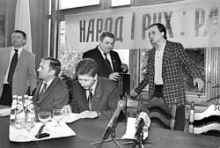A press conference of Rukh’s founding fathers, announced by People’s Movement of Ukraine Press Secretary Dmytro Ponamarchuk, has been met with interest by the mass media, with about fifty members of the press turning up for the occasion. Some of them have covered Rukh from the very start. It would be quite interesting to see sitting at the same table again Mykhailo Horyn and Ivan Drach who vied for Rukh’s leadership back in 1990 and, incidentally, contributed to Rukh’s first split. Serhiy Koniev, who initiated the meeting of the founding fathers, called it “a test of goodwill.”
Yet, there was no test. Out of the eight invited persons only two showed up, Oleksandr Lavrynovych and Bohdan Boyko, not counting Koniev and Ponamarchuk. The organizers were forced to fill the void with Boyko’s Rukh 3 colleague, People’s Deputy Filipchuk. Still, another round of talks on the unity of Rukh, given the list of negotiators, have yielded more questions than answers. As Oleksandr Lavrynovych appropriately noted, any new attempt to unite Rukh has ended in the emergence of a new organization. A vivid example of this are Messrs. Filipchuk and Boyko who have recently created a weird Rukh For Unity and now want to turn the clock back, wishing to become a full-fledged part of a new united Rukh enjoying the same rights as Rukh per se and the organization led by Yuri Kostenko.
It is clear that Rukh’s unification is a matter of urgency and only those without planning to get elected to the new parliament can deny this. Reports from the regions, which come in daily, reveal that members of all shades of Rukh have become sick of the continuous unification process. Alas, local hugging of Rukh splinters will have no legal consequences, unless supported by appropriate moves by party bosses who are engaged in complex maneuvering and noncommittal declarations.
On the surface, Koniev’s initiative to get together the founders of the original Rukh seems to make a great deal of sense. The formula for the meeting was equally well-worded, implying that the event has nothing to do with the existing Rukhs. However, as Ponamarchuk reiterated, the invited Rukh members have been banned by their party councils to attend the meeting. What is behind all this?
The strict party discipline binding on all Kostenko-led Rukh members is evidence that no one there wants to lose control over the unification process. History shows that, as soon as a group of national democrats get together, they almost surely sign a declaration on the formation of a new entity. This is why neither Ivan Drach, Pavlo Movchan, Volodymyr Cherniak, nor Vasyl Chernovy whom Serhiy Koniev all classified as the founding fathers, would never attend such a meeting on their own and without an OK from their party. Serhiy Koniev should not have done his classification as it is common knowledge that each Ukrainian initiative has so many fathers that the issue of paternity might best be dropped at once.
Unaware of the consequences and apparently with the best of intentions, the initiators of Rukh’s founding fathers meeting have yet again repeated the same error — they began to weigh party seniority. Ponamarchuk did not fail to mention that he has been Rukh’s press secretary since 1989. Instead of finding new fathers, Rukh could do better by raising its own children. Otherwise, it all leads to a very funny situation such that the number of fathers is growing and the number of children is too small for a party claiming a key role in the country’s political life. The young do not wish to know about them and have no burning desire to attend Rukh meetings. The young, and all other voters for that matter, will be interested in other things, like what agenda the united Rukh will propose to its old and new voters.
That is the major problem. For such a once mighty political party as Rukh it would be too primitive to indicate its goals, merely using the For or Against Kuchma pattern. Rukh will never be able to become again the constructive opposition party it once was. Meanwhile, instead of clarifying their stand toward Ukraine’s vital issues, members of all shades of Rukh engage in talking unification and forming a party led by Yushchenko. There is little ammunition in such arguments. Testing one’s goodwill, sincerity, and clear party agendas is what Rukh leaders will inevitably face, but not all of them can be confident of a positive test score.







